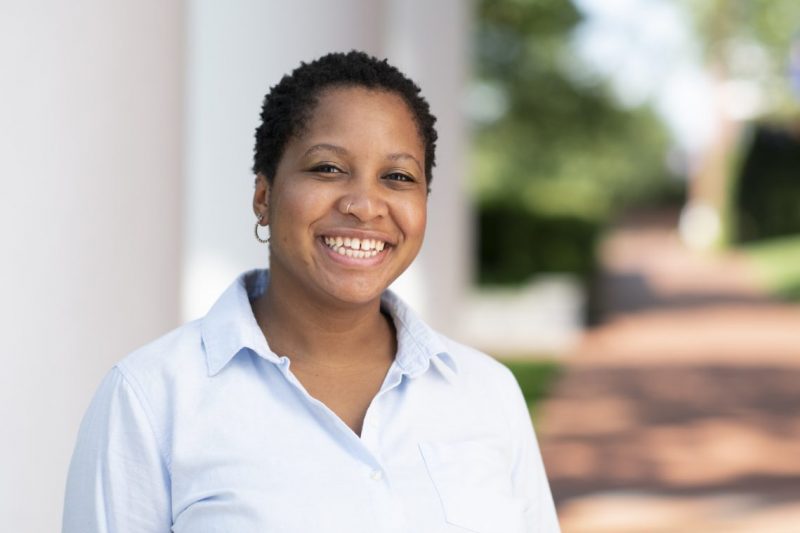Meet the Professor: Nneka Dennie Nneka Dennie, a new member of the History Department faculty, has already participated in a number of thought-provoking panel discussions at W&L.
Nneka Dennie joined the W&L History Department this year after spending time as a postdoctoral fellow at Davidson College, a visiting scholar at the Massachusetts Institute of Technology, and an affiliate faculty member at the University of Cincinnati.
Dennie is a Black feminist scholar who specializes in 19th and 20th century African-American history, particularly Black feminist thought, Black intellectual history, Black radicalism and transnational feminism. She is currently working on two book manuscripts that are under contract. This term, she is teaching Black Radical Women and African American Intellectual History.
In her brief time at W&L, Dennie has already made significant contributions to the community conversation, joining three panel discussions that delved into topics including antiracism, white acvitists and Black freedom, perspectives on Black protest, and female abolitionists.
Dennie took a few moments to answer some questions about teaching.
Q: Why do you teach?
As I neared the end of my undergraduate education, I felt like I still had a lot of learning left to do. I still had questions that needed answers — questions I could only pursue fully if I went to graduate school. I decided to become a professor because at the time, it seemed to me that there are three main things professors do: read, write and talk. These are all things I enjoy greatly.
I also teach because it offers me a way to help others understand a range of social problems that we encounter today. Teaching courses that dive into topics like slavery, Black protest traditions, and Black feminism allows me to equip students with the tools to understand how white supremacy, patriarchy and capitalism have shaped the world we live in today. My courses on African American history in general, and Black women’s history in particular, illustrate how race, gender and class exert powerful influences on contemporary society. We need to grapple with these histories in order to be better equipped to combat racism, sexism and class exploitation.
Q: What have you enjoyed about teaching at W&L so far?
One of the main draws of being at W&L is the students. They’re curious, they’re bright and they ask thought-provoking questions. I really appreciate being in an environment where students are invested in engaging with the material we’re looking at together. There have been a few times over this academic year where students asked questions that introduced me to a different way of seeing topics I’ve studied extensively, and our in-class discussions have encouraged me to look at my research projects in a new light.
I’m also enjoying conducting my research on Black women’s intellectual history at W&L because I get to introduce new audiences to my work. I’ve been able to do several campus-wide talks this year as part of the Activism and Black Life series hosted by the Africana Studies Program and at events hosted by the Student Association for Black Unity. This has allowed me to reach a broader audience of folks who might not necessarily enroll in history classes, or who are unfamiliar with many of the issues I address in my research. I also value the opportunity to support the work that the Africana Studies Program and SABU are doing by discussing my research and teaching.
Q: What would be your dream course to teach?
I’m actually teaching it right now! This term I’m teaching Black Radical Women, which is a course I’ve been thinking about for a few years. Originally, I planned for the course to examine how Black women have resisted patriarchy, racial violence and state-sanctioned oppression throughout the African diaspora from the 19th century to the present. I wanted this to be a transnational course that took a comparative look at the theories and activism that have characterized Black women’s radicalism in the U.S., the Caribbean and Africa. As we drew closer to the first day of class, however, I chose a different approach because the course seemed like a unique opportunity to help students contextualize the tumultuous contemporary moment.
Teaching Black Radical Women this term seemed timely given the social and political issues that have arisen over the past year, including protests for racial justice in the wake of George Floyd’s and Breonna Taylor’s deaths at the hands of the police; the ongoing COVID-19 pandemic; and controversies over the election results. As such, rather than sticking with my original plan, I centered the course entirely on the U.S. We’re focusing primarily on three themes: the persistence of, as well as overlap between, state violence and mob violence; Black women’s critiques of American democracy and other political systems; and the criminalization of Black people in general and Black activists in particular. We’ve had great discussions in class, and I’m so excited for the rest of the term.
If you know any W&L faculty who would be great profile subjects, tell us about them! Nominate them for a web profile.
 Assistant Professor of History Nneka Dennie
Assistant Professor of History Nneka Dennie
You must be logged in to post a comment.